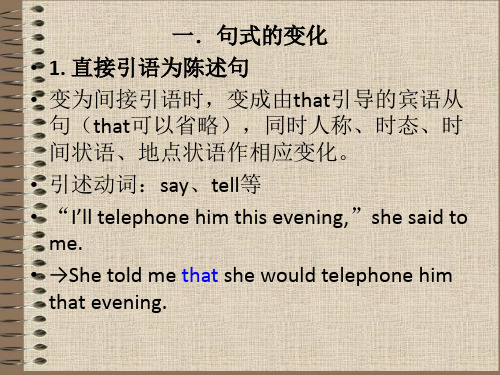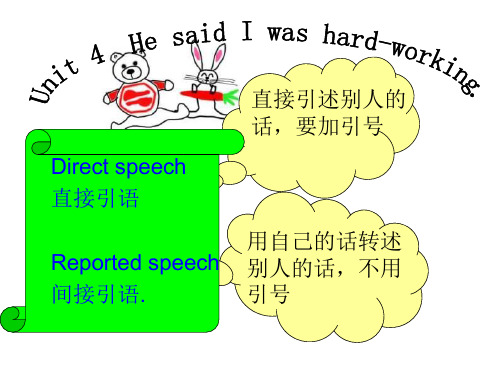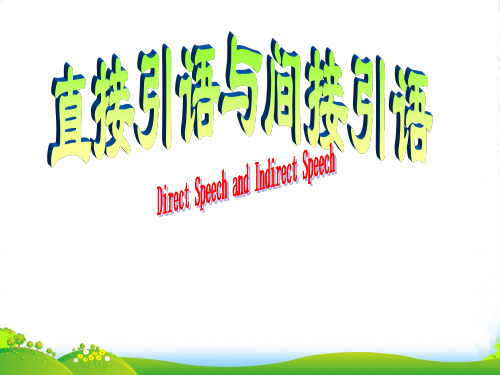八年级英语上册+直接引语间接引语课件+人教新目标版
合集下载
英语直接引语和间接引语 PPT课件

直接引语是疑问句,变间接引语时, 要从疑问语序变为陈述语序。
直接引语是一般疑问句,变为间接引
语时,用连词 if 或 whether 连接。
直接引语是特殊疑问句,变为间接引 语时,仍用原来的疑问词作连词来引导。
Direct Speech
The policeman ordered:“Be quiet.” The teacher said to the boy ,”Open the window .”
Indirect Speech
She asked me whether\if I had seen the film. He asked John if\whether he was a doctor.
She asked us where we were going to get off.
He asked them who had given them a talk the day before.
词的宾语。 注意:否定句,在动词不定式前加
not或never.
解题步骤: 1.陈述句
“I don’t like computers,” Sandy said to her friends.
Sandy said to her friends that I don’t like
computers. said
next month
地点状语 方向性动词 情态动词
here come, bring can, may, must
间接引语
that, those
then that day that week
the day before
the week before the next/following day the next/ following month
直接引语和间接引语(19张PPT)初中英语专项复习课件

直接引语变间接引语
一、直接引语&间接引语 – 定义 二、句子结构变化规则 三、语序变化规则 四、人称变化规则 五、时态变化规则 六、指代状动变化规则
一、直接引语 间接引语 -- 定义
直接引语:引用别人的原话; Peter said “ Jack is a Bully!” 间接引语:用自己的话转述别人的话(宾语从句) Peter said that Jack was a Bully.
She said, “ I broke your phone.” She said that she _h_a_d_b_r_o_k_e_n my phone.
现在完成时→ 过去完成时
She said, “ He has gone home.” She said that he __h_a_d_g_o_n_e__ home.
go take have to
六、指代状动变化规则
5变: 指代状动
指示代词 时间状语 地点状语
this→that; these→those
now→then; today→that day; yesterday→the day before last week→the week before; tomorrow→the next day
一般现在时→ 一般过去时
He said, “ I know it.” He said that hek_n_e_w it.
现在进行时→ 过去进行时
He said, “ I am drinking milk.” He said that he _w_a_s_d_r_in_k_i_ng_ milk.
一般过去时→过去完成时
• 4.The teacher said, “The sun is bigger than the moon.”
一、直接引语&间接引语 – 定义 二、句子结构变化规则 三、语序变化规则 四、人称变化规则 五、时态变化规则 六、指代状动变化规则
一、直接引语 间接引语 -- 定义
直接引语:引用别人的原话; Peter said “ Jack is a Bully!” 间接引语:用自己的话转述别人的话(宾语从句) Peter said that Jack was a Bully.
She said, “ I broke your phone.” She said that she _h_a_d_b_r_o_k_e_n my phone.
现在完成时→ 过去完成时
She said, “ He has gone home.” She said that he __h_a_d_g_o_n_e__ home.
go take have to
六、指代状动变化规则
5变: 指代状动
指示代词 时间状语 地点状语
this→that; these→those
now→then; today→that day; yesterday→the day before last week→the week before; tomorrow→the next day
一般现在时→ 一般过去时
He said, “ I know it.” He said that hek_n_e_w it.
现在进行时→ 过去进行时
He said, “ I am drinking milk.” He said that he _w_a_s_d_r_in_k_i_ng_ milk.
一般过去时→过去完成时
• 4.The teacher said, “The sun is bigger than the moon.”
直接引语和间接引语(15张PPT)初中英语专项复习课件

相应的变化
→He asked me if I had a computer.
他问我是否有计算机。
用法
举例
Bill said, “She is my elder sister. ” →Bill said that she was his elder sister. 比尔说她是他的姐姐。
第三人称不更新 The teacher told Mary’s parents, “Mary is
直接引语中的第三 a good girl. She is always ready to help 人称在间接引语中 others. ”
不发生变化
→The teacher told Mary’s parents that
Mary was a good girl and she was always
ready to help others.
老师问我是否会游泳。
用法
例句
(3) 如 果 直 接 引 语
是特殊疑问句,要 “What are you doing? ”my father asked.
用 相 应 的 疑 问 词 →My father asked what I was doing.
who, whom, whose, 爸爸问我在做什么。
过去将来时
例句
Nina told me, “Linda is watching TV at home. ”→Nina told me (that) Linda was watching TV at home. 尼娜告诉我琳达正在家看电视。
She said, “I will see you at the same place tomorrow. ”
(三)指示代词、时间和地点等变化
直接引语和间接引语(精美PPT)

return
指示代词 时间状语
变化
动词
动词
地点状语
指示代词的变化
• this-that e.g. • She said, “I’ll finish the work this morning.” • She said that she would finish the work that morning.
He said that he had finished the homework before supper.
• ⑥一般将来时→过去将来时
e.g. Zhou Lan said, “I’ll do it after class.” → Zhou Lan said that she would do it after class.
时间状语的变化
• yesterday-the day before e.g. • She said, “I went there yesterday.” • She said that she had gone there the day before.
时间状语的变化
• tomorrow-the next day /the following day e.g. • She said, “I’ll go there tomorrow.” • She said that she would go there the next day.
时间状语的变化
• ago- before/earlier e.g. • She said, “He left 30 minutes ago.” • She told me that he had left 30 minutes before.
时间状语的变化
指示代词 时间状语
变化
动词
动词
地点状语
指示代词的变化
• this-that e.g. • She said, “I’ll finish the work this morning.” • She said that she would finish the work that morning.
He said that he had finished the homework before supper.
• ⑥一般将来时→过去将来时
e.g. Zhou Lan said, “I’ll do it after class.” → Zhou Lan said that she would do it after class.
时间状语的变化
• yesterday-the day before e.g. • She said, “I went there yesterday.” • She said that she had gone there the day before.
时间状语的变化
• tomorrow-the next day /the following day e.g. • She said, “I’ll go there tomorrow.” • She said that she would go there the next day.
时间状语的变化
• ago- before/earlier e.g. • She said, “He left 30 minutes ago.” • She told me that he had left 30 minutes before.
时间状语的变化
直接引语和间接引语PPT课件

陈述句直接引语的用法
在句子中直接插入被引述人的原话,放在引号内,并注明说话人。
陈述句直接引语的例子
“我认为这个问题很重要,”他说。
疑问句直接引语
疑问句直接引语的定义
01
直接引用别人的疑问句,用于询问信息或表达疑问。
疑问句直接引语的用法
02
在句子中直接插入被引述人的疑问句,放在引号内,并注明说
话人。
答案
该句是直接引语,其中的错误是时态不匹配,应改为"He said that he had been to the Great Wall."
进一步学习资源推荐
语法书籍
《英语语法大全》、《英语语法 手册》等,这些书籍详细讲解了 英语语法的各个方面,包括直接 引语和间接引语的用法和规则。
在线课程
各大在线教育平台提供英语语法 课程,如Coursera、edX等,这 些课程通常由资深英语教师授课, 内容系统全面。
03
02
直接引语是直接引用别人的原话,而间接引 语是转述别人的话。
04 联系
直接引语和间接引语都是用来表达别人的 话语。
05
06
在一定条件下,直接引语可以转换为间接 引语,间接引语也可以转换为直接引语。
03 直接引语在句子中运用
陈述句直接引语
陈述句直接引语的定义
直接引用别人的原话,用于陈述事实或表达观点。
05 直接引语变间接引语方法 技巧
人称变化规则
第一人称
若直接引语中的引述动词为say 或tell等,变为间接引语时,若 主句的主语为第一人称,其人称
不变。
第二人称
若直接引语中的引述动词为say to sb.或tell sb.等,变为间接引 语时,若主句的主语为第一人称, 其人称变化与上述第一人称情况
在句子中直接插入被引述人的原话,放在引号内,并注明说话人。
陈述句直接引语的例子
“我认为这个问题很重要,”他说。
疑问句直接引语
疑问句直接引语的定义
01
直接引用别人的疑问句,用于询问信息或表达疑问。
疑问句直接引语的用法
02
在句子中直接插入被引述人的疑问句,放在引号内,并注明说
话人。
答案
该句是直接引语,其中的错误是时态不匹配,应改为"He said that he had been to the Great Wall."
进一步学习资源推荐
语法书籍
《英语语法大全》、《英语语法 手册》等,这些书籍详细讲解了 英语语法的各个方面,包括直接 引语和间接引语的用法和规则。
在线课程
各大在线教育平台提供英语语法 课程,如Coursera、edX等,这 些课程通常由资深英语教师授课, 内容系统全面。
03
02
直接引语是直接引用别人的原话,而间接引 语是转述别人的话。
04 联系
直接引语和间接引语都是用来表达别人的 话语。
05
06
在一定条件下,直接引语可以转换为间接 引语,间接引语也可以转换为直接引语。
03 直接引语在句子中运用
陈述句直接引语
陈述句直接引语的定义
直接引用别人的原话,用于陈述事实或表达观点。
05 直接引语变间接引语方法 技巧
人称变化规则
第一人称
若直接引语中的引述动词为say 或tell等,变为间接引语时,若 主句的主语为第一人称,其人称
不变。
第二人称
若直接引语中的引述动词为say to sb.或tell sb.等,变为间接引 语时,若主句的主语为第一人称, 其人称变化与上述第一人称情况
直接引语与间接引语最全课件

主句为过去的某种时态,直接引语变为间接引语时, 时态要发生变化
Nina told me,“Lisa is studying abroad.” → Nina told me that Lisa was studying abroad. Nell said,“I have worked out this problem.” → Nell said (that) she had worked out that
一般现在时 一般将来时 一般过去时 现在进行时 现在完成时 过去完成时 现在完成进行时
can may must
间接引语 一般过去时 过去将来时 过去完成时 过去进行时 过去完成时 过去完成时 过去完成进行时
could might must/had to
Practice
二.人称的变化
• 直接引语中的人称代词转化为间接引语时变化原 则:一随主,二随宾,第三人称不更新。
• They told Mary,“We will help you out of trouble.” • They told Mary that they will help her out of trouble.
一.句式的变化
• 1. 直接引语为陈述句 • 变为间接引语时,变成由that引导的宾语从
句(that可以省略),同时人称、时态、时 间状语、地点状语作相应变化。
• 引述动词:say、tell等 • “I’ll telephone him this evening,”she said to
me.
• →She told me that she would telephone him that evening.
5. She asked me, "When do they have their dinner?"
Nina told me,“Lisa is studying abroad.” → Nina told me that Lisa was studying abroad. Nell said,“I have worked out this problem.” → Nell said (that) she had worked out that
一般现在时 一般将来时 一般过去时 现在进行时 现在完成时 过去完成时 现在完成进行时
can may must
间接引语 一般过去时 过去将来时 过去完成时 过去进行时 过去完成时 过去完成时 过去完成进行时
could might must/had to
Practice
二.人称的变化
• 直接引语中的人称代词转化为间接引语时变化原 则:一随主,二随宾,第三人称不更新。
• They told Mary,“We will help you out of trouble.” • They told Mary that they will help her out of trouble.
一.句式的变化
• 1. 直接引语为陈述句 • 变为间接引语时,变成由that引导的宾语从
句(that可以省略),同时人称、时态、时 间状语、地点状语作相应变化。
• 引述动词:say、tell等 • “I’ll telephone him this evening,”she said to
me.
• →She told me that she would telephone him that evening.
5. She asked me, "When do they have their dinner?"
直接引语和间接引语课件

直接引语 (变化前) 间接引语(变化后)
陈述句
that引导的宾语从句
Jane said, “I’m Jane said that she was
very fond of
very fond of traveling.
traveling.”
He said , “I am a senior student.” He said that he was a senior student.
祈使句
不定式
The officer said to The officer ordered
him, “Don’t leave him not to leave his
your post.”
post.
He said , “Don’t make so much noise, boys.”
He told/ordered/asked the boys not to make so much noise.
直接引语 (变化前) 间接引语(变化后)
特殊疑问句
wh-词引导的宾语从
“Mary, when will 句
you return me the John asked Mary
book?” asked John. when she would
return him the book.
1. “Whose book is it?” he asked. He asked whose book it was.
变化 the next day.
tomorrow.”
由直接引语转变为间接引语,下列代词、 形容词、副词、动词等可能要变化
直接引语
间接引语
this these now ago today
陈述句
that引导的宾语从句
Jane said, “I’m Jane said that she was
very fond of
very fond of traveling.
traveling.”
He said , “I am a senior student.” He said that he was a senior student.
祈使句
不定式
The officer said to The officer ordered
him, “Don’t leave him not to leave his
your post.”
post.
He said , “Don’t make so much noise, boys.”
He told/ordered/asked the boys not to make so much noise.
直接引语 (变化前) 间接引语(变化后)
特殊疑问句
wh-词引导的宾语从
“Mary, when will 句
you return me the John asked Mary
book?” asked John. when she would
return him the book.
1. “Whose book is it?” he asked. He asked whose book it was.
变化 the next day.
tomorrow.”
由直接引语转变为间接引语,下列代词、 形容词、副词、动词等可能要变化
直接引语
间接引语
this these now ago today
(完整版)英语直接引语和间接引语PPT课件

直接引语是疑问句,变间接引语时, 要从疑问语序变为陈述语序。
直接引语是一般疑问句,变为间接引
语时,用连词 if 或 whether 连接。
直接引语是特殊疑问句,变为间接引 语时,仍用原来的疑问词作连词来引导。
Direct Speech
The policeman ordered:“Be quiet.” The teacher said to the boy ,”Open the window .”
Indirect Speech
She asked me whether\if I had seen the film. He asked John if\whether he was a doctor.
She asked us where we were going to get off.
He asked them who had given them a talk the day before.
They asked him if it is easy to work out the problem.
asked
is
was
They asked him if it was easy to work out the problem.
3.特殊疑问句:
When do you harvest the wheat ? ( They asked him )
Direct Speech and Indirect Speech
引语的概念
直接引述别人的原话,叫 _直__接__引__语_____;
用自己的话把别人的话陈述出来,叫 _间__接__引__语__。 直接引语通常都用__引__号__“____”__括起来, 间接引语在多数情况下都构成一个 _宾__语__从__句_。
直接引语和间接引语课件

解题步骤: “Don’t Don’t talk in class,” the teacher said to us. The teacher said said to to us not to talk in class told The teacher told us not to ta上的变化
解题步骤: 1). 陈述句变间接引语时,用that连接, that 无实际意义,可省略。例 : “I don’t like computers,” Sarah said to her friends. Sarah said to her friends that I don’t like computers. Sarah said she
2>.直接引语为一般过去时并且与具体 时间状语连用时,间接引语仍用一般 过去时。例如 : She said:" I went to England in 1998.”
She said she went to England in 1998.
3.人称的变化。
直接引语里的第一人称和第二人称,变间接引语 时,人称要做相应调整。例如: 直接引语 She said:“ I am hungry。”
didn’t
Sarah said to her friends that she didn’t like computers.
Lana said : “I am mad at Marcia.” Lana said ( that ) she was mad at Marcia. He said : “We are good at English.” He said (that ) they were good at English. She said to me : “She does her homework every night.” She told me( that )she did her homework every night.
直接引语与间接引语ppt最全课件

problem.
经营者提供商品或者服务有欺诈行为 的,应 当按照 消费者 的要求 增加赔 偿其受 到的损 失,增 加赔偿 的金额 为消费 者购买 商品的 价款或 接受服 务的费 用
2024/2/17
直接引语 一般现在时 一般将来时 一般过去时 现在进行时 现在完成时 过去完成时 现在完成进行时
can may must
经营者提供商品或者服务有欺诈行为 的,应 当按照 消费者 的要求 增加赔 偿其受 到的损 失,增 加赔偿 的金额 为消费 者购买 商品的 价款或 接受服 务的费 用
二.人称的变化
• 直接引语中的人称代词转化为间接引语时变化原 则:一随主,二随宾,第三人称不更新。
• They told Mary,“We will help you out of trouble.” • They told Mary that they will help her out of trouble.
Practice
• She said. "My brother wants to go with me." • He said to Kate. "How is your sister now?" • Mr. Smith said: "Jack is a good worker。"
经营者提供商品或者服务有欺诈行为 的,应 当按照 消费者 的要求 增加赔 偿其受 到的损 失,增 加赔偿 的金额 为消费 者购买 商品的 价款或 接受服 务的费 用
here come bring
there go take
经营者提供商品或者服务有欺诈行为 的,应 当按照 消费者 的要求 增加赔 偿其受 到的损 失,增 加赔偿 的金额 为消费 者购买 商品的 价款或 接受服 务的费 用
经营者提供商品或者服务有欺诈行为 的,应 当按照 消费者 的要求 增加赔 偿其受 到的损 失,增 加赔偿 的金额 为消费 者购买 商品的 价款或 接受服 务的费 用
2024/2/17
直接引语 一般现在时 一般将来时 一般过去时 现在进行时 现在完成时 过去完成时 现在完成进行时
can may must
经营者提供商品或者服务有欺诈行为 的,应 当按照 消费者 的要求 增加赔 偿其受 到的损 失,增 加赔偿 的金额 为消费 者购买 商品的 价款或 接受服 务的费 用
二.人称的变化
• 直接引语中的人称代词转化为间接引语时变化原 则:一随主,二随宾,第三人称不更新。
• They told Mary,“We will help you out of trouble.” • They told Mary that they will help her out of trouble.
Practice
• She said. "My brother wants to go with me." • He said to Kate. "How is your sister now?" • Mr. Smith said: "Jack is a good worker。"
经营者提供商品或者服务有欺诈行为 的,应 当按照 消费者 的要求 增加赔 偿其受 到的损 失,增 加赔偿 的金额 为消费 者购买 商品的 价款或 接受服 务的费 用
here come bring
there go take
经营者提供商品或者服务有欺诈行为 的,应 当按照 消费者 的要求 增加赔 偿其受 到的损 失,增 加赔偿 的金额 为消费 者购买 商品的 价款或 接受服 务的费 用
初中英语直接引语和间接引语 PPT

Mom told me not to chat with strangers、
8)、 “ Go shopping with me, please?” said Mr、 Wang 、
Mr、 Wang asked me to go shopping with him、
He asked me what I was going to do、
6)“How do you go to school every day?” asked Mr、 Zhang、 Mr、 Zhang asked how I went to school everyday、
7)、 Mom said,“ Don‘t chat with strangers、”
He asked them, “Who gave you a talk yesterday?”
Reported Speech
She asked me whether\if I had seen the film、 He asked John if\whether he was a doctor、
She asked us where we were going to get off、
Reported Speech
She said she liked singing、 She said she was waiting for a bus、 She said she had visited Europe the year before、 She said she had never met an American、 She said she would see me the next week、
引号内得第三人 She said to me , She told me that
8)、 “ Go shopping with me, please?” said Mr、 Wang 、
Mr、 Wang asked me to go shopping with him、
He asked me what I was going to do、
6)“How do you go to school every day?” asked Mr、 Zhang、 Mr、 Zhang asked how I went to school everyday、
7)、 Mom said,“ Don‘t chat with strangers、”
He asked them, “Who gave you a talk yesterday?”
Reported Speech
She asked me whether\if I had seen the film、 He asked John if\whether he was a doctor、
She asked us where we were going to get off、
Reported Speech
She said she liked singing、 She said she was waiting for a bus、 She said she had visited Europe the year before、 She said she had never met an American、 She said she would see me the next week、
引号内得第三人 She said to me , She told me that
初中英语之直接引语和间接引语PPT文档35页

45、自己的饭量自己知道。——苏联
33、如果惧怕前面跌宕的山岩,生命 就永远 只能是 死水一 潭。 34、当你眼泪忍不住要流出来的时候 ,睁大 眼睛, 千万别 眨眼!你会看到 世界由 清晰变 模糊的 全过程 ,心会 在你泪 水落下 的那一 刻变得 清澈明 晰。盐 。注定 要融化 的,也 许是用 眼泪的 方式。
35、不要以为自己成功一次就可以了 ,也不 要以为 过去的 光荣可 以被永 远肯定 。
初中英语之直接引语和间接 引语
31、别人笑我太疯癫,我笑他人看不 穿。(名 言网) 32、我不想听失意者的哭泣,抱怨者 的牢骚 ,这是 羊群中 的瘟疫 ,我不 能被它 传染。 我要尽 量避免 绝望, 辛勤耕 耘,忍 受苦楚 。我一 试再试 ,争取 每天的 成功, 避免以 失败收 常在别 人停滞 不前时 ,我继 续拼搏 。
41、学问是异常珍贵的东西,从任何源泉吸 收都不可耻。——阿卜·日·法拉兹
42、只有在人群中间,才能认识自 己。——国
43、重复别人所说的话,只需要教育; 而要挑战别人所说的话,则需要头脑。—— 玛丽·佩蒂博恩·普尔
44、卓越的人一大优点是:在不利与艰 难的遭遇里百折不饶。——贝多芬
33、如果惧怕前面跌宕的山岩,生命 就永远 只能是 死水一 潭。 34、当你眼泪忍不住要流出来的时候 ,睁大 眼睛, 千万别 眨眼!你会看到 世界由 清晰变 模糊的 全过程 ,心会 在你泪 水落下 的那一 刻变得 清澈明 晰。盐 。注定 要融化 的,也 许是用 眼泪的 方式。
35、不要以为自己成功一次就可以了 ,也不 要以为 过去的 光荣可 以被永 远肯定 。
初中英语之直接引语和间接 引语
31、别人笑我太疯癫,我笑他人看不 穿。(名 言网) 32、我不想听失意者的哭泣,抱怨者 的牢骚 ,这是 羊群中 的瘟疫 ,我不 能被它 传染。 我要尽 量避免 绝望, 辛勤耕 耘,忍 受苦楚 。我一 试再试 ,争取 每天的 成功, 避免以 失败收 常在别 人停滞 不前时 ,我继 续拼搏 。
41、学问是异常珍贵的东西,从任何源泉吸 收都不可耻。——阿卜·日·法拉兹
42、只有在人群中间,才能认识自 己。——国
43、重复别人所说的话,只需要教育; 而要挑战别人所说的话,则需要头脑。—— 玛丽·佩蒂博恩·普尔
44、卓越的人一大优点是:在不利与艰 难的遭遇里百折不饶。——贝多芬
八年级英语直接引语和间接引语(PPT)5-3

如果主句是一般现在时,直接引语变间接引语时,
从句的时态不变。
He says, “I’m not good at math. ”
练
He says that he’s not good at math.
习
1.“You should be more careful next time,” his father sai d to him.
直接引述别人的 话,要加引号
Direct speech 直接引语
用自己的话转述
Reported speech 别人的话,不用
间接引语.
引号
类而意思相对的词或词素的前面,表示“既不…也不…”。ɑ)表示适中,恰到好处:~多|~死~活。③用在同类而意思相对的词或词素的前面,表示“如果不…就不…”:~见~散|~破~立|~塞~流|~止~行。 【不才】〈书〉①动没有才能(多用; 油猴;来表示自谦):弟子~|~之士。②名“我”的谦称:其中道理,~愿洗耳聆教。 【不测】①形属性词。不可测度的;不可预料的:天有~风云。②名指意外的不幸事件:险遭~|提高警惕,以防~。 【不曾】副没有?(“曾经”的否 定):我还~去过|除此之外,~发现其他疑点。 【不差累黍】形容丝毫不差(累黍:指微小的数量)。 【不成】①动不行?。②形不行?。③助用在句末, 表示推测或反问的语气,前面常常有“难道、莫非”等词相呼应:难道就这样算了~?|这么晚他还不来,莫非家里出了什么事~? 【不成比例】指数量或 大小等方面差得很远,不能相比。 【不成话】不像话。 【不成体统】说话、做事不合体制,没有规矩。 【不成文】形属性词。没有用文字固定下来的:~ 的规矩|多年的老传统~地沿袭了下来。 【不成文法】名不经立法程序而由国家承认其有效的法律,如判例、习惯法等(跟“成文法”相对)。 【不逞】动 不能实现意愿;不得志:~之徒(因失意而胡作非为的人)。 【不齿】〈书〉动不与同列(表示鄙视):人所~。 【不耻下问】不以向地位比自己低、知识 比自己少的人请教为可耻。 【不啻】〈书〉动①不止;不只:工程所需,~万金。②如同:相去~天渊。 【不揣】动谦辞,不自量,用于向人提出自己的见 解或有所请求时:~浅陋|~冒昧(不考虑自己的莽撞,言语、行动是否相宜)。 【不辞】动①不告别:~而别。②不推脱;不拒绝:~辛劳|万死~。 【不错】形①对;正确:~,情况正是如此|~,当初他就是这么说的。②不坏;好:人家待你可真~|虽说年纪大了,身体却还~。 【不打自招】还没有 拷问就招供了。比喻无意中泄露真实情况和想法。 【不大离儿】〈方〉形①差不多;相近:两个孩子的身量~。②还算不错:这块地的麦子长得~。 【不带 音】ī发音时声带不振动。参看页〖带音〗。 【不待】副用不着;不必:自~言|~细说,他就明白了。 【不单】①副不仅?:超额完成生产任务的,~是这 几个厂。②连不但:她~教孩子学习,还照顾他们的生活。 【不但】连用在表示递进的复句的上半句里,下半句里通常有连词“而且、并且”或副词“也、 还”
重庆市涪陵第十一中学八年级英语《直接引语和间接引语》课件 人教新目标

1) He said,“ My brother failed in the exam.” He said __h_i_sbrother had failed in the exam.
2) He said to Mary,“ How is your mother now?” he asked Mary how __h_e_r_mother was then.
如果主句的谓语动词是一般过去时, 直接引语变成间接引语时,从句的时态 要做出相应的改变.
2
直接引语时态
一般现在时 现在进行时 现在完成时 一般过去时 过去完成时 一般将来时
间接引语时态
一般过去时 过去进行时 过去完成时 过去完成时 不变 过去将来时
1.“ I am ill today.” said my mother. My mother said that she was ill that day. 2.“We work hard at English.” he sHaeids.aid that they worked hard at English.
It is easy to improve the condition of the soil.
They asked him if it is easy to improve the
condition of the soil.
asked
is
was
They asked him if it was easy to improve the condition of the soil.
直接引语变间接引语时, 句中的情态动词也应做相应的改变
直接引语
间接引语
can may shall/will
could might should/would
2) He said to Mary,“ How is your mother now?” he asked Mary how __h_e_r_mother was then.
如果主句的谓语动词是一般过去时, 直接引语变成间接引语时,从句的时态 要做出相应的改变.
2
直接引语时态
一般现在时 现在进行时 现在完成时 一般过去时 过去完成时 一般将来时
间接引语时态
一般过去时 过去进行时 过去完成时 过去完成时 不变 过去将来时
1.“ I am ill today.” said my mother. My mother said that she was ill that day. 2.“We work hard at English.” he sHaeids.aid that they worked hard at English.
It is easy to improve the condition of the soil.
They asked him if it is easy to improve the
condition of the soil.
asked
is
was
They asked him if it was easy to improve the condition of the soil.
直接引语变间接引语时, 句中的情态动词也应做相应的改变
直接引语
间接引语
can may shall/will
could might should/would
- 1、下载文档前请自行甄别文档内容的完整性,平台不提供额外的编辑、内容补充、找答案等附加服务。
- 2、"仅部分预览"的文档,不可在线预览部分如存在完整性等问题,可反馈申请退款(可完整预览的文档不适用该条件!)。
- 3、如文档侵犯您的权益,请联系客服反馈,我们会尽快为您处理(人工客服工作时间:9:00-18:30)。
将疑问句语序还原成陈述句语序
既然我们已经掌握了将一个陈述句语序改为疑问语序的方法,那么, 我们再将一个疑问句语序改回成陈述句语序也就很容易了。 She is… Is she……? He will… Will he……? She has… Has she….? Dose he like music? He likes music。把借来的dose去掉like用三
三.分四种情况一一讲解
1.当直接引语是一个陈述句时,这是最简单 的一种: 去引号,改人称,改时态,加引导词that (常常省略) 例:He said,“I am going to study English.” He said he was going to study English. his Tom said,“my mother mother was a worker.” is Tom said — ——— —— a worker.
3.当直接引语是一个特殊疑问句时: 除了去引号,改人称,改时态外,将引语 中原有的特殊疑问词直接做引导词,再把 疑问句语序改为陈述句语序。 He asked,“what is Bob doing?” He asked,what Bob was doing. Jim asked,“where do they play games?” where they played Jim asked,____ ____ _____ games.
前面反复提到了改时态这个环节,但是,有一种情况是不 能改变时态的: 当直接引语是一个客观真理,自然规律时,无论任何情况 都一律只用一般现在时态,记住:真理是永远不能改变的。 Our teacher said,“the moon goes round the earth.” Our teacher said the moon goes round the earth. My mother said,“the light travels faster than the sound” . My mother said the light travels faster than the sound.
2.当直接引语是一个一般疑问句时: 除了去引号,改人称,改时态以外,还要 加引导词if/whether,再把疑问句语序改为 陈述句语序。 例:She asked,“is Mr Green an English teacher?” She asked if Mr Green was an English teacher. He asked,“does she have lunch at home?” if she had He asked,__ __ ___lunch at home.
陈述句语序和疑问句语序
.陈述句语序:主语在前,谓语在后 疑问句语序:主语在后,系动词/助动词在前。 Is is a student?直接将is提前 She she astudent.
Will you beijing. I will go togo to Beijing?直接将Will提前 Has she been to the zoo. She has been to the zoo?直接将has提前 Dose he like music?借用does构成 He likes music. Did they watch TV last night?借用did构成 They watched TV last night.
Reported speach and directed speach 直接引语与间接引语
一.直接引语与间接引语的概念
1. 直接引语是直接引述别人的话,有引号。 例:lily said,“I am a teacher.” (引号中的I是lily) 间接引语是用自己的话转述别人的话,无引号。 例:lily said she was a teacher.(she指lily) 2.间接引语大多可以构成宾语从句,在动词said, asked, told等后面做宾语。上面例句就是。 lily said she was a teacher.句中she was a teacher是 said(说)的宾语。
祝你学习进步,天天快乐! Goodbye!
练习题
1.Mr Green said,“I don’t like sports.” he didn’t like Mr Green said___ _____ _____ sports. 2.Our teacher asked,“will if rain?” it it would Our teacher asked us___ ____ _____rain. 3.The doctor asked,“what dose what have for lunch?” Tom Tom had The doctor wanted to know____ _____ _____ for lunch. 4.“Don’t play on the street.”Mr wu told us. not to play Mr wu told us_____ ____ ______on the street. travels around 5.Sam said,“the earth travels around the sun.” Sam said the earth _______ ______ the sun.
单式likes They watched TV.把借来的did去掉watch 用过去式watched
Did they watchTV?
ห้องสมุดไป่ตู้
4.当直接引语是一个祈使句时: 肯定祈使句改为:主语+asked/told sb to do sth. 否定祈使句改为:主语+asked/told sb not to do sth. “Come here early.”Mr wu told us. Mr wu told us to come here early “Don’t sleep late.”my mother said to me. My mother asked me not to sleep late. “Put the book away.”Jim said to me. to put Jim asked me__ _____ the book away. t “Don’t laugh ino class.”the teacher told Marry. not The teacher told Marry___ ___ ______ in class. to laugh
二.将一个直接引语改为间接引语时要记住下面 几点:
1.人称的改变。 2.时态的改变。
一般现在式 一般将来式 现在进行式 现在完成式
一般过去式 过去将来式 过去进行式 过去完成式
3.语序的改变。将疑问句语序改为陈述句语 序。(针对直接引语是疑问句的情况。) 4.应用引导词that(可以省略),whether/if, 或what/where/when等。
